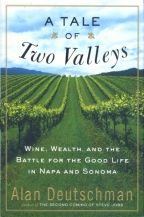A Tale of Two Valleys
Alan Deutschman
Broadway Books / Random House
US hardcover First
ISBN 0-767-90703-5
Publication Date: 04-08-2003
221 Pages; $23.95
Date Reviewed: 04-10-03
Reviewed by Rick Kleffel © 2003

REFERENCES
COLUMNS
|
|
|
A Tale of Two ValleysAlan DeutschmanBroadway Books / Random HouseUS hardcover FirstISBN 0-767-90703-5Publication Date: 04-08-2003221 Pages; $23.95Date Reviewed: 04-10-03Reviewed by Rick Kleffel © 2003 |
|
|
REFERENCES |
COLUMNS |
Not all writers are tortured artistes, toiling in gray lofts, tearing out their hair as they struggle with life-and-death issues that sear their souls. Some writers make a point of documenting the opposite experience. Peter Mayle spent 'A Year in Provence' after chucking his dull British lifestyle and moving to the wine country of France. Reality crashed in and perhaps put a few clouds in his heavenly skies, but the life he lived was no less idyllic. Frances Mayes spent her vacation 'Under the Tuscan Sun: At Home in Italy'. Her book reads like the lovely prose version of an advertisement for a vacation in Mediterranean boot. Alan Deutschman, having made some big-money Silicon Valley friends while writing about 'The Second Coming of Steve Jobs' decided to try the same tack on the left coast of the United States in the wine country of Napa and Sonoma Counties. 'A Tale of Two Valleys' goes easy on the idyll and instead finds the author living the good life of a pampered political activist. Sure, there are the great parties and wonderful wines, the charming local characters and the lovely landscapes, but woven throughout the beauty there's a complex web of conflict between the old money, new money, new new money, some money and no money classes. Carefully distinguishing between a zillion shades of politics ranging from tree-sitting to clear-cutting, the author finds himself drawn into the conflict he was only trying to document. The result is more fun than a solid hour of hot overheard gossip at any of San Francisco's trendiest restaurants.
Deutschman starts his novel with a journey into the heart of Sonoma. It's a one-hour drive but a five-month process. He moves into the house bought by a rich technocrat friend in Sonoma, also known as Slow-noma, and immediately finds himself embroiled in a debate over chickens in the town square. As Deutschman gets to know the residents, so does the reader. But the writer does more than let the reader vicariously live the good life. He gets deeply and clearly into the complex range of politics that has allowed Sonoma residents to live that good life for so long. It's a weird mix of folks in that county. You've got immigrant old money, has-been hippies living on the cheap, resident aliens working the fields, rich cyber-entrepreneurs constructing modern-art masterpiece houses on scenic hillsides and avaricious corporations buying up scenic land to create exclusive world-class resorts. As Deutschman observes, he can't stop himself from getting involved. But he's not exactly cut out for the duty. On a scenic nature walk, he rushes back to a bathroom and rinses himself with cold water to sluice away the poison oak he's been traipsing through. But he does like the easy-going ambience of Sonoma.
Napa is another matter. In some ways, it's a possible vision of the future for Sonoma. There's big money, really big money and inconceivably huge money jostling for attention on a worldwide wine-auction stage. The charm of the region is as freeze-dried as the hair of its wealthy residents. Deutschman is not immune to this charm, but his newfound friends in Sonoma have activated his political sensibilities. He can't live this good a life with a clear conscience.
Deutschman plays this out against the background of the Fall 2000 election and a potential wine-economy apocalypse if the glassy-winged sharpshooter has its way. From the conservative 'Napkins' of Napa to the hairy-eyed Yes activists of Sonoma, the race is on to control the future of this still-beautiful valley. Does it become a Western Tuscany or a northern Santa Clara? Already nicknamed Telecom Valley, Sonoma is on a path to unpleasant urbanization. With this kind of money at stake, it's no wonder that death enters the picture. Fast-paced, funny and grimly reflective of larger battles at hand, Deutschman's 'A Tale of Two Valleys' is no mere pleasant picnic. Living the good life can cost you a bundle. Deutschman was lucky enough to have someone else to pick up the tab, and he gives his readers the most entertaining itemized receipt they're like to come across.